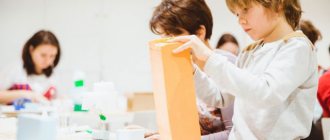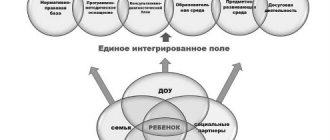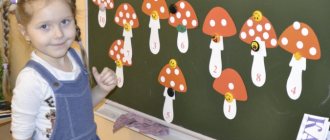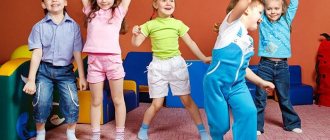Child-parent conferences as one of the forms of organizing interaction between preschool educational institutions and families
From work experience:
Aronova Natalya Mikhailovna,
teacher speech therapist
MADO "Kindergarten No. 68"
Berezniki, Perm region
Child-parent conferences,
as one of the forms of organizing joint activities of a speech therapist teacher, parents and children with disabilities in a preschool educational institution»
A modern educational institution is unthinkable without systematic, meaningful interaction with the family. The family is not only one of the customers of an educational institution and the consumer of its educational services, but first of all, the family is the basis for educating the child’s personality; it is no coincidence that the family is the institution of primary socialization of a growing person [2, 114].
Parents are the first and main (in terms of strength and degree of influence) educators of the child.
A kindergarten is a place where it is interesting and comfortable not only for the child, but also for the parent, for whom all the conditions have been created to help reveal their own parental potential. A preschool institution is a territory of joint family creativity, helping both the child and the parent in building partnerships and developing their own “I” [4,221].
In our preschool educational institution for children with severe speech impairment, interaction between the kindergarten and the family is built through openness in solving common educational problems, creating real opportunities for parents to participate in co-management, based on the position of the kindergarten
–
professional
family assistant in matters of speech correction and child upbringing. The position of dominance based on the principle “we are teachers - we know better what is needed” is excluded. We try to form a position of dialogue and informal interaction based on mutual respect and trust. In accordance with the Federal State Educational Standard for Educational Education, one of the conditions necessary for creating a social situation for the development of children is the direct involvement of parents in joint educational activities and support of family educational initiatives.
The defining goal of various joint activities in the triad “teachers-parents-children” is to satisfy not only the basic aspirations and needs of the child, but also the aspirations and needs of parents and teachers [1,16].
The main goal of interaction between the speech therapist and the family is the inclusion of parents in the joint correction process and the creation of a single speech space [3, 49].
During the interaction, the following tasks are solved: • developing in parents a desire to help the child; • formation of motivation to participate in the educational process; • increasing the level of pedagogical competence of parents; • informational and didactic support for the family [5, el. resource].
From work experience, it became clear that contradictions sometimes arise between parents and preschool teachers. Some parents demand and openly declare that a kindergarten should be involved in the upbringing and education of children, but they want to see the result at the end of kindergarten, i.e. child fully prepared for school. This parent group is unlikely to be able to actively attend seminars and consultations. But with the correct organization of interaction, they will be happy to prepare a family work for the competition at home together with the child, and select photographs.
Other parents passively observe the work of the kindergarten. The task of teachers is to prevent this group of parents from remaining in the position
passive observer, activate their pedagogical skills, involve them in the work of the kindergarten.
Still others want to take part in the educational process, but they do not have time for this. We involve these parents in competitions and communicate with them via the Internet. And only some parents are interested in active interaction with the kindergarten. Teachers rely on this group when preparing for meetings, matinees and other group events.
An annual survey and filling out questionnaires in our group showed that at the beginning of training in the speech group there were 40% of parents in the first group, 15% in the second group, 30% in the third group, and only 15% in the fourth group.
Due to the lack of participation of parents in the life of their child, the banal absence of any idea of what a “successful” parent should be, a certain problem arises in the relationship between the child and his family.
Preschool teachers are concerned with the following questions:
• how to interest parents in working together?
• how to make them participants in the correctional educational process? You can help parents become an active participant in raising their own child through the use of various forms of work: traditional and innovative.
Work practice shows that the most effective and modern direction of interaction with parents is their direct involvement in the educational process of the kindergarten so that parents and other family members can contribute to correctional, educational and educational work. Cooperation with parents in a speech therapy group is a system of active interaction between children, parents, educators and a speech therapist teacher, aimed at overcoming the child’s speech problems in modern forms of organizing activities. Thanks to joint classes, master classes, trainings, and parent-child conferences, we create in parents activity, awareness, independence, competence and understanding of their own role in the correctional educational process.
In my practice, parent-child conferences in senior and preparatory groups using multimedia presentations have become popular. Children and their parents prepare for this event independently at home. The speech therapist teacher is the coordinator of this activity: he monitors, corrects the presentation materials, and prepares the course of the conference. We hold conferences on such topics as “Who lives in the woods?”, “Insects through the eyes of children”, “And in Africa, and in Africa”, “Wintering birds”, etc. Even at the first meeting, when parents were introduced to the features of speech groups, focused them on this type of work and announced the topics of future conferences. Before starting the actual preparation for this event, we discussed the importance and effectiveness of this type of interaction for me, as a speech therapist, for parents and children. The kindergarten will acquire active assistants in the form of parents. Parents will interact closely with children and teachers and realize the importance of their participation in the correction process, and children will become more successful and gain concrete experience in communicative interaction. When preparing all conferences, we use a system-structural approach. First, the children independently chose their research object in accordance with the topic. Of course, speech therapists exercise control over the choice, taking into account the individual and speech capabilities of the children. Then the preparatory work began. Parents selected materials for their children’s performances on the Internet and, if necessary, prepared costumes and attributes. Teachers edit speech material taking into account the children’s capabilities, advise parents what material will be told by children and what by adults. Then parents prepared presentations for speeches in accordance with the corrected texts. If adults did not have the skills to create presentations, they were trained by speech therapists. Then the painstaking work began on the children memorizing the prepared material at home and with the teachers of the institution. At the next stage of preparing the conference, I prepared a script for the event. During the conference, it was necessary not only to convey material on a certain topic, but also to make the learning process interesting, moderately entertaining, and relieve the fatigue that arises during the activity. And finally, the crucial moment came for the implementation of the plan. Everyone: children, parents, and teachers, of course, were a little worried. Some parents were unable to overcome their inhibitions, and their children acted as speakers on their own. During the conferences, children and parents asked questions and helped each other. But the eyes of those children whose parents performed with them shone with such delight. During the conference, messages from children and parents alternated with physical exercises, musical and dance performances, and games. The event ended with some kind of re-enactment or dramatization performed by the children, which was a surprise for the parents and always evoked a positive assessment from adults. These events were another step in overcoming the child’s speech problems and in parents’ awareness of the importance of joint interaction with their children.
Now we were ready to go with our parents to the city level. The family of Roma Sh. participated in the city parent-child conference of project work “Kaleidoscope of Family Values” with a presentation of work on the topic “Mom, Dad, Brother and I – Together a Friendly Family.” In their speech, mother and son spoke about family traditions and painstaking work to develop the speech and creative abilities of their children. They organized an exhibition of works and shared their experience of family education.
And, of course, we could not ignore the city parent-child conference “Open Book” and the city festival “Family Readings” held within its framework.
We began our work to prepare for the city conference “Open Book” by introducing the students’ parents to the regulations on holding this event and obtaining their consent to participate in the festival. The goal of the festival was also determined: to identify the most reading family of preschool educational institutions. In order for the Family Readings festival to be successfully implemented, the speech therapist, teacher, together with teachers and parents, drew up an action plan, which included several important aspects:
— a quiz for children and parents “Teremok of Fairy Tales” (the goal is to introduce parents and children to book culture and instill interest in RNS); — master class for parents, “What books to read to children.” At this event, parents were introduced to the age-related characteristics of students’ perception of children’s literature. We aimed them at the correct selection of works and showed them techniques and methods of working with the book.
— release of a booklet for parents “Reading is the best teaching” and a guide “How to read books to children”;
— organizing an exhibition of homemade books “Young Storytellers”; — staging a fairy tale with speech therapy tasks “Kolobok learns to speak.” This fairy tale was shown to children in the older group. After all these events, Sasha V.’s family was chosen to participate in the city conference. Mom and son talked about how their family gets acquainted with books of different types. They showed what activities can be done with a child after reading a book, and introduced those present at the conference to their book interests. Parents saw the results of their work, children felt the support of their parents, and together they gained invaluable experience, which will be very useful at school.
Thus, the inclusion of parents in the educational process gave them the opportunity to understand the essence of the correctional work carried out with their child, to feel the communication style of the speech therapist, to “get involved” in the communication themselves, to observe the interaction of their child with peers and adults, and to learn playful pedagogical techniques. Parents learned to independently choose acceptable methods and techniques for joint activities with their children that are suitable for working at home. Achieving the level of partnership with parents is the main indicator of the effectiveness of these forms of interaction.
Literature
1. Bachina O.V., Samorodova L.N. Interaction between a speech therapist and the family of a child with speech impairments. M., 2009, p. 16
2. Doronova T.N. Interaction between preschool institutions and parents. [Text]// T.N. Doronova, M.: “Sphere”, 2002, P. 114
3. Perchatkina E. Cooperation between speech therapist and parents // Preschool education. 1998 No. 11, p.49.
4. Solodyankina O.V. Cooperation between preschool and family. Benefit for preschool employees. [Text]// O.V. Solodyankina, M.: “Arkti”, 2005, P. 221.
5. Modern forms of work with parents [Electronic resource]//https://www.vseodetishkax.ru/rabotnikam-doshkolnogo-obrazovaniya/112-sotrudnichestvo-pedagogov-i-roditelej-/798-sovremennye-formy-raboty-s- roditelyami-v-doshkolnom-uchrezhdenii.




